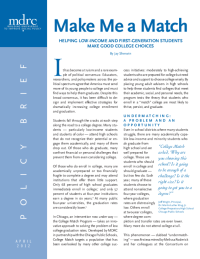Make Me a Match
Helping Low-Income and First-Generation Students Make Good College Choices
It has become a truism and a rare example of political consensus: Educators, researchers, and policymakers across the political spectrum agree that America must send more of its young people to college and must find ways to help them graduate. Despite this broad consensus, it has been difficult to design and implement effective strategies for dramatically increasing college enrollment and graduation.
Students fall through the cracks at each step along the road to a college degree. Many students — particularly low-income students and students of color — attend high schools that do not recognize their potential or engage them academically, and many of them drop out. Of those who do graduate, many confront financial or personal challenges that prevent them from even considering college.
Of those who do enroll in college, many are academically unprepared or too financially fragile to complete a degree and may attend institutions that offer them little support. Only 68 percent of high school graduates immediately enroll in college, and only 57 percent of students at four-year institutions earn a degree in six years. At many public four-year universities, the graduation rates are considerably lower.
In Chicago, an intervention now under way — the College Match Program — takes an innovative approach to solving the problem of low college graduation rates. Developed by MDRC in partnership with the Chicago Public Schools, College Match targets a population that has been overlooked by many other college success initiatives: moderately to high-achieving students who are prepared for college but need advice and support to choose college wisely. By placing young adult advisers in high schools to help these students find colleges that meet their academic, social, and personal needs, the program tests the theory that students who enroll in a "match" college are most likely to thrive, persist, and graduate.
This policy brief describes the intervention and offers encouraging early findings from a pilot in three Chicago high schools. It concludes with a discussion of issues related to further expansion, modification, and testing of the model.






